Digital Forensic Research Lab

BANNER: Yevgeny Prigozhin speaks on June 24, 2023 (top left); a Wagner statue in Krasnodar Krai, Russia (top right); alleged Wagner soldier training Sudanese armed forces (bottom left); grain shipments to Sudan marked “From Russia with love, courtesy of Yevgeny Prigozhin” (bottom right)
Over a 36-hour period starting on Friday, June 23, Yevgeny Prigozhin captured global attention by launching an armed mutiny against the Russian state with his company of Wagner mercenaries deployed in Russia’s war of aggression against Ukraine. After posting a diatribe aimed at Russia’s military leadership and its management of the war effort, Prigozhin and his forces took over the Russian city of Rostov, Russia’s Southern Military District headquarters, and marched within 200 kilometers of Moscow before standing down in a fragile truce that exposed increasing fractionalization within Russia while the world watched live updates on social media.
For the last six years, the DFRLab has tracked Prigozhin’s various activities – including security efforts, like Wagner Group, and propaganda efforts, like the Internet Research Agency – across four continents.
Prigozhin has been one of Russian President Vladimir Putin’s closest aides as Putin has taken a more assertive and destabilizing role around the world since coming back for a third (and effectively indefinite term) as president in 2012. Prigozhin has played central roles both officially and quasi-officially in Putin’s efforts to maintain domestic control, extend military power, and project influence operations including strategic disinformation around the world. This includes, but is hardly limited to, undermining domestic opposition figures within Russia; a central role in the initial invasion of parts of Ukraine and annexation of Crimea in 2014; Russia’s support of Assad in Syria; Russia’s interference and influence operations against US elections and other western democracies; increasing security presence in various African countries in return for revenue or control of extractive industries; and providing assistance to the Maduro regime in Venezuela. The list of operational activity would make any fictional Bond villain suffer professional jealousy.
The bottom line is that Yevgeny Prigozhin’s efforts have most always been a direct extension of the Russian state, such as it is. Putin admitted as much when he described Wagner Group activities during his post-mutiny speech on June 27, stating, “We fully funded this group from the federal budget.” Prigozhin, a warlord, propagandist, and oligarch, is a leader uniquely cultivated in and by Putin’s two-decade grip on power, and he has served an indispensable role whenever a more aggressive but deniable approach is required.
The following is a collection of DFRLab research focused on Prigozhin, Wagner, the Internet Research Agency, or other related efforts dating back six years. pulled from our research archive of more than a thousand investigations and case studies. The collection is organized in reverse chronological order by region, including Europe, North America, the Middle East, Africa, and Latin America.
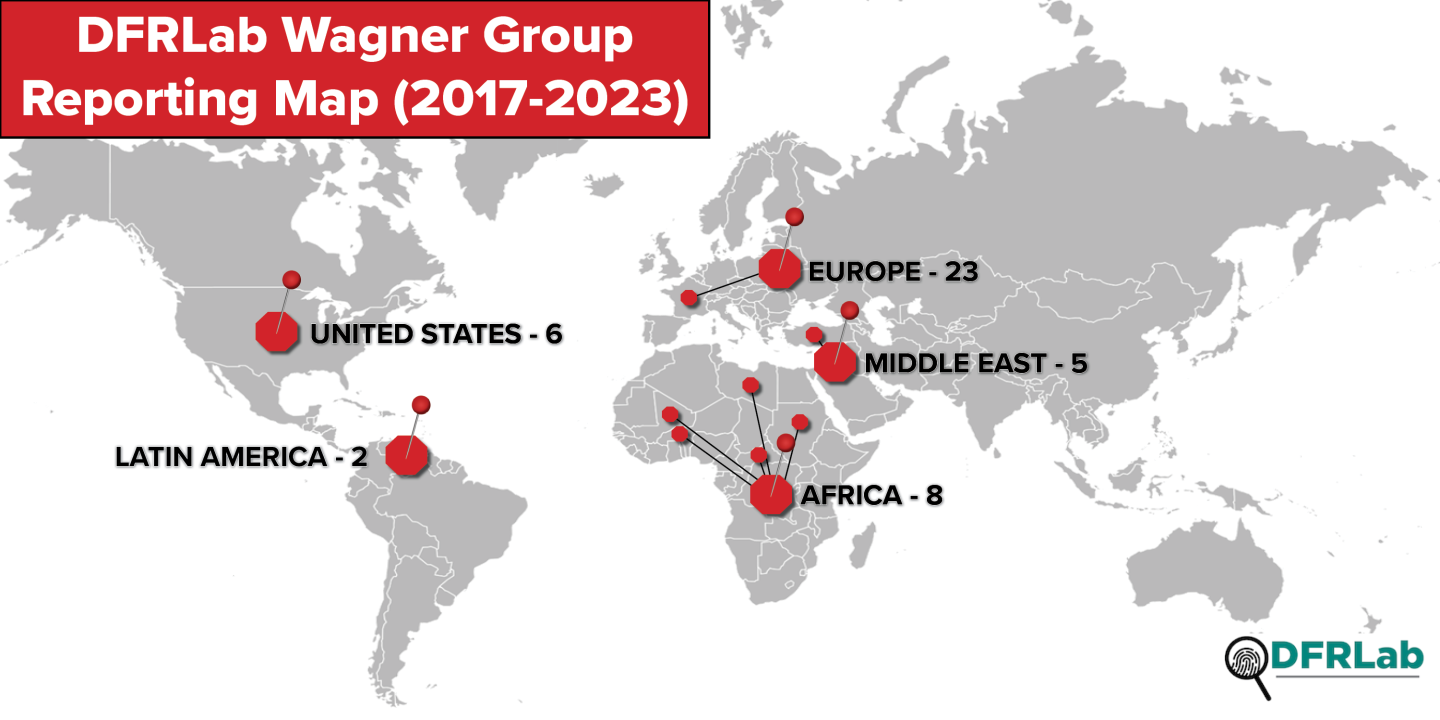
If you’re trying to catch up on the mutiny itself, you should start with our June 26 special edition of our weekly Russian War Report, Prigozhin and Wagner forces mutiny against Moscow. As you’ll see from the collection of Wagner activity in the lead-up to the mutiny, Prigozhin’s public statements very clearly indicated his growing rift with Russian military leadership.
The future is never certain for a Russian oligarch fallen out of grace, but Prigozhin’s past efforts have certainly been a force for Putin’s authoritarian control at home and support abroad.
UKRAINE, RUSSIA, AND ELSEWHERE IN EUROPE
Wagner attempts to draft gamers as drone pilots (June 23, 2023)
A June 19 Telegram post from Russian opposition news outlet Verstka claimed that Wagner Group is encouraging gamers to apply to serve as unmanned aerial vehicle pilots in the war against Ukraine.
Prigozhin threatens Wagner withdrawal from Bakhmut (May 5, 2023)
In a Telegram video published on May 5, Prigozhin stood in front of a group of Wagner fighters and threatened to withdraw Wagner forces from Bakhmut. He added that they will “celebrate” Russia’s May 9 Victory Day “with the brilliance of Russian weapons” and then hand the positions over to the Russian defense ministry.
Russian army continues to pressure Ukraine in Bakhmut (March 17, 2023)
Wagner Group and the Russian military’s rivalry continued to heat up as Wagner’s forces continue to be the primary units fighting within Bakhmut. However, the urban environment made combat particularly dangerous and progress slow.
DFRLab confirms increased Russian air force activity as Kremlin strives to achieve air dominance (March 3, 2023)
A look into the Russian army, with assistance from Wagner troops, to encircle Bakhmut and cut Ukraine’s supply lines to the city in a bid to force troops to surrender or withdraw.
Russian hacker wanted by the FBI reportedly wins Wagner hackathon prize (January 13, 2023)
In December 2022, the Wagner Group organized a hackathon at its recently opened headquarters in St. Petersburg, for students, developers, analysts, and IT professionals. The objective of the hackathon was to “create UAV positioning systems using video recognition, searching for waypoints by landmarks in the absence of satellite navigation systems and external control.”
 (Source: FBI.gov)
(Source: FBI.gov)Wagner forces make limited advances toward Bakhmut (November 4, 2022)
Early reports on Wagner’s efforts to take Bakhmut and Donetsk. In one his first public rebukes of Russia’s ruling class, Prigozhin publicly criticized Russian oligarchs and elites for living in a “state of comfort” and preventing a total mobilization in Russia.
Early reports from military bloggers suggested that Prigozhin was sponsoring the formation of volunteer battalion, including crews for Pantsir-S1 and S-300 missile systems, Man-portable air-defense systems (MANPADS), electronic warfare, Su-25 aircraft, and other equipment.
Wagner sends vehicles to Kherson while Iran increases military support (October 21, 2022)
Early reporting on Wagner’s presence in the current conflict in Ukraine as a Wagner-affiliated Telegram channel announced on October 14 that Wagner fighters would transfer vehicles to the 126th Coastal Defense Battalion in support of Russian army efforts to hold the frontline in Kherson.
Ukraine secures new territory as Prigozhin recruits Russian prisoners (September 16, 2022)
In September, Prigozhin was filmed speaking to convicts, promising amnesty to those that sign up to fight in Ukraine. Those that survived the six months would be pardoned. Prigozhin revealed that prisoners had already been fighting on the frontlines with the Wagner Group.
Wagner forces attempt to encircle Bakhmut and cut off vital Ukrainian supply routes (September 16, 2022)
After gaining control over Soledar in mid-January, Wagner Group soldiers attempted to encircle Bakhmut. At the end of January, Wagner shared a photo of its soldiers standing in front of a sign reading “Blahodatne” as evidence they had seized the village of the same name.
Wagner forces capture village in Donestk Oblast (September 9, 2022)
One of the first publicly confirmed instances in which Wagner confirmed that its fighters were actively participating in the war in Ukraine. Wagner forces helped capture Kodema in Donetsk Oblast. Taking control of Kodema opened the possibility for a Russian offensive that eventually led to Bakhmut.
Hackers, Hoodies, and Helmets: Technology and the changing face of Russian private military contractors (July 25, 2022)
This issue brief seeks to offer an initial exploration regarding private military companies like Wagner Group came about, how they are employed, and the changing role of technology in conflict and the activities of these PMCs.
In the first six months of the war in Ukraine, speculation of Wagner’s presence grew as the Russian army initially struggled to taken eastern Ukraine without additional support. The group’s relatively low profile in Ukraine at the time ran counter to their typically boisterous positioning in Africa and the Middle East.
Russian online media outlets targeted Lithuania with a disinformation campaign claiming Yevgeny Prigozhin, an oligarch close to the Kremlin, had been let into the country. In reality, the man these outlets presented as Prigozhin was an impersonator, who, according to a new report by Lithuania’s intelligence services, made two visits to Lithuania in 2020.
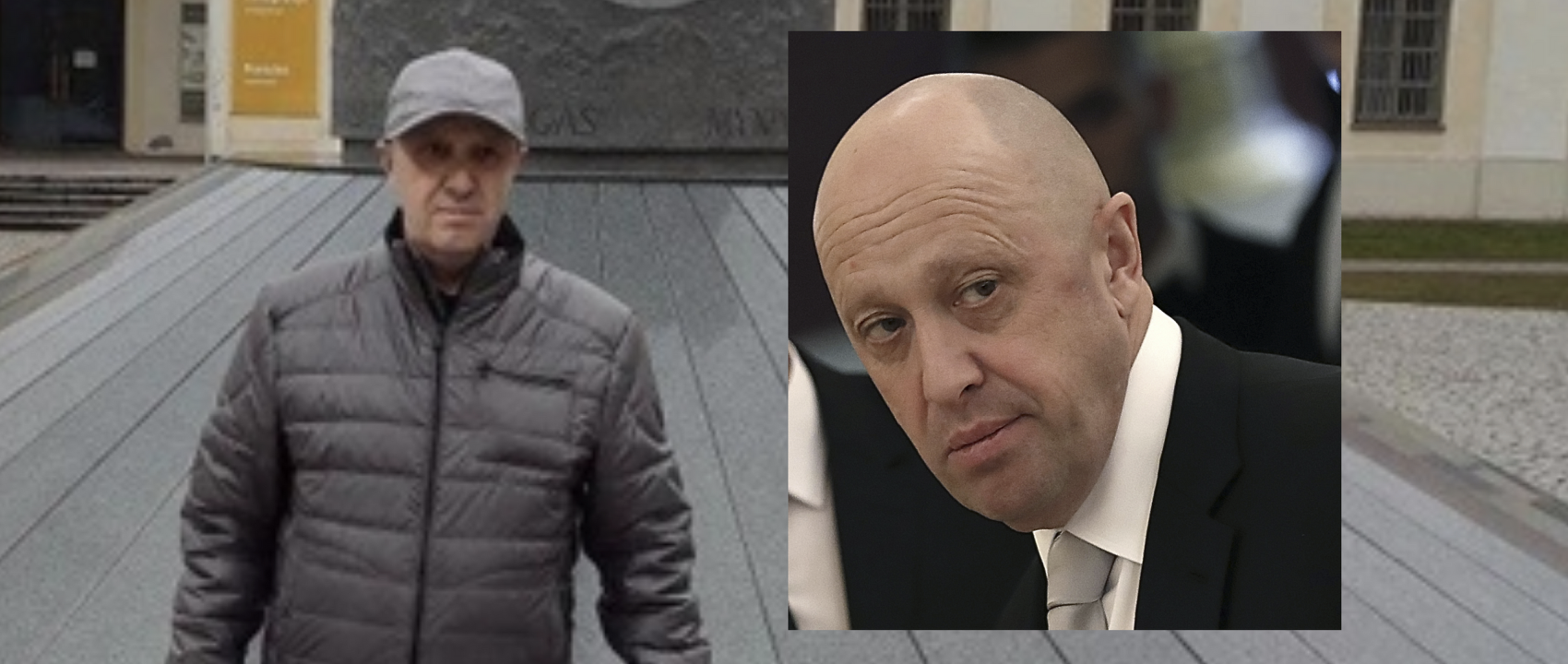 Left: Prigozhin impersonator photographed in front of the Lithuanian National Museum, one of several images of the impersonator distributed by Russian media. Right: file photo of Evgeny Prighozin at the Kremlin, July 4, 2017. (Sources: Delovaya Gazeta and REUTERS/Sergei Ilnitsky/Pool)
Left: Prigozhin impersonator photographed in front of the Lithuanian National Museum, one of several images of the impersonator distributed by Russian media. Right: file photo of Evgeny Prighozin at the Kremlin, July 4, 2017. (Sources: Delovaya Gazeta and REUTERS/Sergei Ilnitsky/Pool)In July 2020, 33 men allegedly working for Wagner PMC were detained by Belarusian authorities outside of Minsk. Approximately 200 militants are said to have entered Belarus to “destabilize the situation during the election campaign.” Several of those detained were former fighters who had taken part in the ongoing war in eastern Ukraine, the Middle East, and Africa.
 Security camera footage shows Wagner troops entering Belarus. (Source: АТН: новости Беларуси и мира)
Security camera footage shows Wagner troops entering Belarus. (Source: АТН: новости Беларуси и мира)From Policeman to Mercenary: Portrait of a Wagner Fighter (June 7, 2019)
An expose on Andrey Karpov, a retired paratrooper, veteran of the counter-insurgency in Chechnya, and decorated police major, who turned gunslinger for Russia’s interests abroad as a member of the Wagner Group.
The Most Famous Wagner Soldier (April 8, 2019)
Many of the mercenaries that serve in Russian PMCs are military veterans. Vyacheslav Korneev, also known as “Goblin”, is one of these veterans. This profile examined the veteran who served in Wagner PMC in Ukraine and Syria through his large digital footprint.
Krasnodar Joins Dead Mercenaries Society (March 14, 2019)
In late November 2018, pictures appeared on Russian social media platform VKontakte of a statue commemorating mercenaries from the Wagner Group in an undisclosed location in Russia. The DFRLab confirmed that the statue is in Russia’s Krasnodar region, not far from Wagner’s training facilities in Molkino.
 Details from satellite imagery geolocate the position of a Wagner statue at their training facility in Molkino, Krasnodar Krai, Russia. (Source: Google Maps, left, bottom right; @bad_moskal/archive, top right, top left)
Details from satellite imagery geolocate the position of a Wagner statue at their training facility in Molkino, Krasnodar Krai, Russia. (Source: Google Maps, left, bottom right; @bad_moskal/archive, top right, top left)Wagner’s Role in Key Ukrainian Battle Revealed (July 12, 2018)
A video filmed in the winter of 2014 and 2015 showed soldiers from Wagner Group riding towards Debaltseve to take part in the battle for the key railway hub of Debaltseve. The videos were taken from a flash drive that was recovered by Ukrainian forces as a “trophy,” though the original owner of the footage is unknown.
Trolls on Twitter (Mar 24, 2018)
Since the British government accused Russia of an “illegal use of force” against the United Kingdom by attempting to poison former spy Sergei Skripal and his daughter Yulia in the English city of Salisbury, Twitter has become a battleground. Some incidents appear to involve organized activity, including possibly fake accounts masquerading as English users in the well-known pattern of Yevgeny Prigozhin’s “troll factory” in St. Petersburg.
Russian Trolls Target British MPs (Dec 21, 2017)
In December 2017, the British parliament debated Russian interference in the United Kingdom’s democratic processes. Ahead of the debate, it was suggested that Russian internet trolls — anonymous, abusive accounts — may be targeting Members of Parliament (MPs) who criticize Russia and its propaganda. The DFRLab looked into several potential cases and found a group of trolls that not only appear pro-Kremlin, but share many of the characteristics of earlier accounts run from Yevgeny Prigozhin’s so-called “troll factory” in St. Petersburg.
Scottish Vote, Pro-Kremlin Trolls (Dec 13, 2017)
Pro-Russian internet trolls fueled claims that Scotland’s independence referendum in 2014 was rigged, and amplified demands for a revote. The behavior of these accounts is pro-Kremlin, and consistent with the behavior of accounts know to be run by Yevgeny Prigozhin’s “troll factory” in St. Petersburg, Russia, during the United States 2016 presidential election. However, it is not possible to determine from open sources whether some or all of the accounts are independent actors, or linked to Russian information operations.
Putin’s praetorians: trolls wrote it, trolls promote it (Oct 30, 2017)
A book glorifying Russia’s internet troll operations was itself written by influential pro-Kremlin trolls.
THE MIDDLE EAST
Disinformation campaign removed by Facebook linked to Russia’s Internet Research Agency (September 24, 2020)
In September 2020, Facebook took down a small network of assets linked to United World International, a fringe blogging outlet that spread anti-Western geopolitical narratives in Turkish and English. The outlet appeared to be managed by several people connected to the Russian Internet Research Agency (IRA), Yevgeny Prigozhin’s notorious Kremlin-linked troll farm known for its interference in the 2016 US presidential elections.
More mercenaries Menace Mesopotamia (March 25, 2019)
Wagner Group attracts the majority of online attention from the research community, in both Syria and beyond. Other Russian private military companies (PMCs), however, are also operating in the region, and their activities are thus far proceeding largely unmonitored.
Tributes to Russian mercenaries from Ukraine to Syria (Mar 9, 2018)
A statue dedicated to Wagner Group soldiers in Luhansk is a copy of another statue erected in Palmyra, Syria.
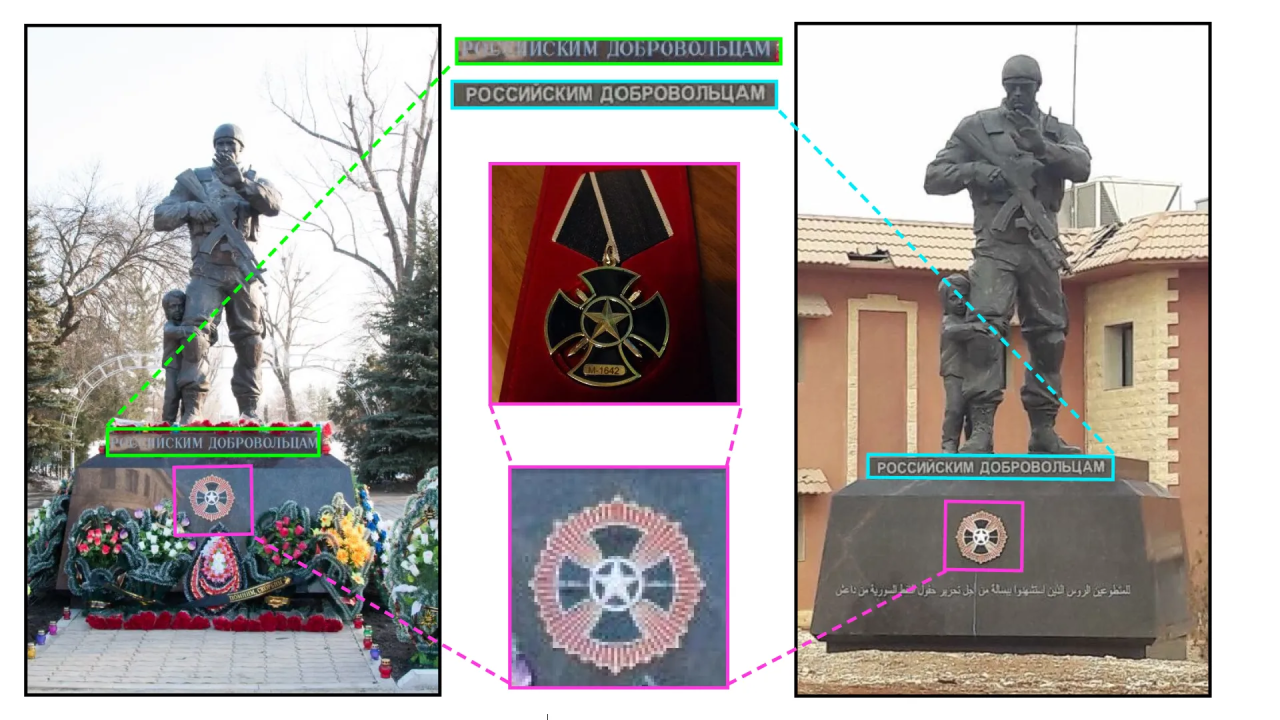 Comparison of the statues in Luhansk (Left) and Palmyra (Right). Left: (Source: Twitter / @RussiansForward); Center: (Source: Facebook / Conflict Intelligence Team); Right: (Source: VK / Sergey Sergeevich).
Comparison of the statues in Luhansk (Left) and Palmyra (Right). Left: (Source: Twitter / @RussiansForward); Center: (Source: Facebook / Conflict Intelligence Team); Right: (Source: VK / Sergey Sergeevich).The Final Ride of the Valkyries (Febrauray 16, 2018)
Strikes on Syrian forces by the United States dominated the western news cycle on February 7, but the story on Russian social media was different. In the days following the event, Russian social media was abuzz with rumors of a crushing defeat, in which hundreds of Russians for the Private Military Contractor (PMC) Wagner perished.
AFRICA
Wagner Group fights French ‘zombies’ in cartoon propaganda (January 20, 2023)
Some of the first public showings of tensions between the Russian military and Wagner Group as the commander of Russian forces in Ukraine then-stated that Wagner forces were not part of structure of the Russian armed forces. In West Africa, an animated video circulated of Wagner mercenaries assisting West African soldiers to kill French zombie soldiers. Finally, a January Telegram post published on Prigozhin’s press channel claimed that Wagner tracked down and killed a Ukrainian member of the French Foreign Legion in Donetsk.
Footage raises additional questions about Wagner presence in Sudan (October 19, 2022)
In July 2022, two videos reportedly showing Wagner Group operatives training Sudanese personnel appeared respectively on a Sudanese and Russian Telegram social media allegedly linked to Wagner. Despite consistent denials from the Sudanese government, evidence strongly the Kremlin-linked PMC is operating in the country and assisting the military in quashing democratic movements.
Local support for Russia increased on Facebook before Burkina Faso military coup (February 17, 2022)
Pro-Russian content spread on West African social media in the months ahead of the January 2022 military coup in Burkina Faso after then-President Roche Kaboré after refusing to employ Wagner. Online support for Moscow and Wagner has steadily increased since the coup, including Facebook pages dedicated to the mercenaries.
Pro-Russian Facebook assets in Mali coordinated support for Wagner Group, anti-democracy protests (February 17, 2022)
A network of pro-Russian and anti-French Facebook pages promoted pro-Wagner Group narratives prior to their official arrival of the private in Mali. These pages also mobilized support for the postponement of democratic elections following a successful coup in May 2021, Mali’s second in less than a year.
First Russian mercenary statue in Africa identified in the Central African Republic (December 20, 2021)
Photos of a new statue commemorating Wagner Group troops in Bangui, Central African Republic were the latest in a series of mercenary statues previously identified in Europe and the Middle East. The statue is one means through which the PMC was practicing soft power throughout the countries in which they were working.
On May 27, 2021, Facebook removed a network of assets using inauthentic profiles, pages, and groups to amplify pro-Russian content in Sudan. The pages and profiles worked to spread positive stories about Russia, focusing specifically on aid packages sent by Russian oligarch Yevgeny Prigozhin and amplifying the benefits of the creation of a Russian military base in Port Sudan.
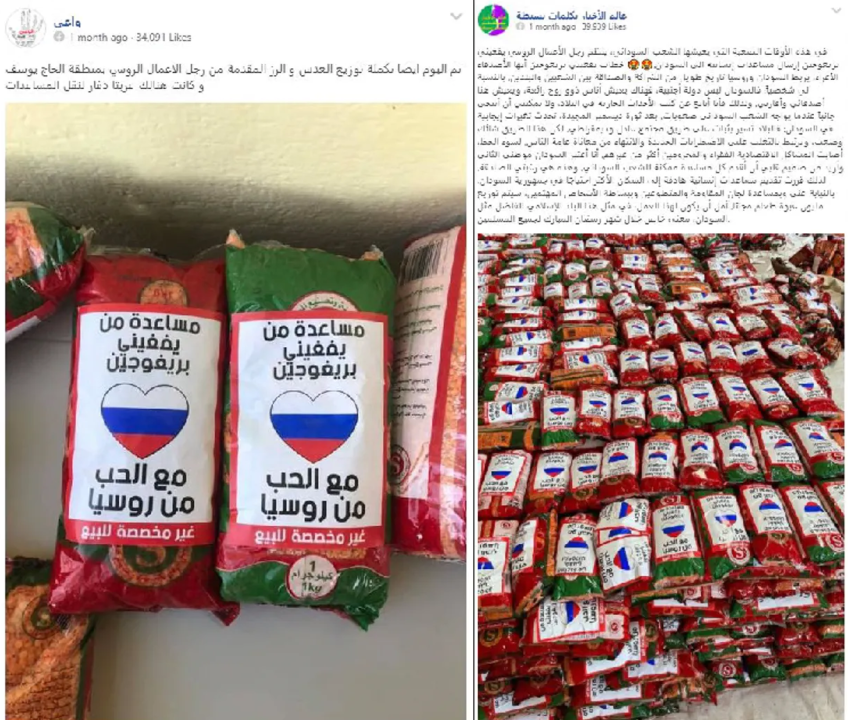 Inauthentic Facebook profiles worked to spam Prigozhin-related content to legitimate Sudanese groups. (Source: Facebook)
Inauthentic Facebook profiles worked to spam Prigozhin-related content to legitimate Sudanese groups. (Source: Facebook)Suspect claims of Wagner mercenaries withdrawing from Libya (April 27, 2021)
Though Libyan officials have denied Wagner’s presence in the country, photographic evidence has suggested otherwise. Wagner forces were supposed to leave Libya by early 2021, but that Wagner mercenaries were seen in the town of Houn and constructing defensive trenches elsewhere in the country cast doubt on their departure.
Prigozhin Meets Libyan military officials (November 24, 2018)
Libyan Field Marshal Khalifa Haftar traveled to Moscow in 2018 for meetings with Russian military officials. One official meeting was attended by Yevgeny Prigozhin. Despite the fact that the Kremlin deny taking an active part in the Libyan conflict, Prigozhin’s presence in the meeting suggested Wagner mercenaries’ involvement in the region.
 Prigozhin meets with Libyan General Khalifa Haftar. (Source: Youtube/ مكتب الاعلام — القيادة العامة للقوات المسلحة الليبية)
Prigozhin meets with Libyan General Khalifa Haftar. (Source: Youtube/ مكتب الاعلام — القيادة العامة للقوات المسلحة الليبية)NORTH AMERICA
#TrollTracker: Favorite Russian troll farm sources (October 20, 2018)
Russia’s Twitter troll operation preferred retweeting American Twitter commentators from the alt-right, but shared news sources from all parts of the political spectrum, according to a database of tweets published by Twitter. The English-language troll operation conducted by Yevgeny Prigozhin’s Internet Research Agency” in St. Petersburg ran from at least 2013 to 2018. It aimed at undermining Democratic presidential candidate Hillary Clinton’s election chances, dividing Americans, and supporting the Kremlin’s policies.
#TrollTracker: Twitter troll farm archives (Oct 17, 2018)
A DFRLab series in four parts examining an archive of ten million tweets published by Yevgeny Prigozhin’s Internet Research Agency and the government of Iran between 2013 and 2018.
Russian trolls on Reddit (April 12, 2018)
In April 2018, Reddit announced that it had found and suspended 944 accounts suspected of being run by Yevgeny Prigozhin’s Internet Research Agency. The behavior of these accounts closely mirrored the troll farm’s operations on Twitter and Facebook. They posed as supporters of American communities, especially the far right and the Black Lives Matter movement.
The Russians Who Exposed Russia’s Trolls (Mar 8, 2018)
Special Prosecutor Robert Mueller’s indictment of thirteen Russian citizens for conducting “interference operations targeting the United States” provided a wealth of detail on the workings of Yevgeny Prigozhin’s Internet Research Agency in St. Petersburg. Many of those details were already known thanks to the work of Russian investigative journalists.
How A Russian Troll Fooled America (Nov 14, 2017)
@TEN_GOP was a masterpiece of disinformation and disguise: a Russian account which masqueraded as an American for over eighteen months, fooling both friends and foes of President Donald Trump in the media, on social media, and even in the Trump campaign. US prosecutors would eventually conclude that the account was run by Yevgeny Prigozhin’s Internet Research Agency.
From troll farm to Trump (October 20, 2017)
Over the course of little more than eighteen months, a Twitter account posing as an ultra-conservative American run from Yevgeny Prigozhin’s notorious “troll factory” in St. Petersburg, Russia, was repeatedly quoted by the mainstream media, interacted with top officials, and may have fed disinformation to the Trump campaign.
LATIN AMERICA
Venezuela: the backstory on Russia’s presence (January 21, 2022)
On January 13, Russian Deputy Foreign Minister Sergei Ryabkov told Russian media outlet RTVI that he would not confirm or deny anything regarding the possibility of deploying Russian military infrastructure in Cuba and Venezuela. Most international affairs commentators have so far dismissed Ryabkov’s statement. US National Security Adviser Jake Sullivan noted the issue was not raised during NATO talks. “If Russia were to move in that direction, we would deal with it decisively,” he said.
Russian military personnel in Venezuela (April 2, 2019)
As tensions in Venezuela escalated between Nicolas Maduro’s regime and protesters in early 2019, rumors circulated that Maduro’s Russian allies had deployed troop or mercenary support. The rumors were proven to be likely true due to the first sighting of troops unloading from two Russian planes in Caracas on March 23, 2019.
 Pro-Wagner animation mocks French soldiers as zombies. (Source:
Pro-Wagner animation mocks French soldiers as zombies. (Source: 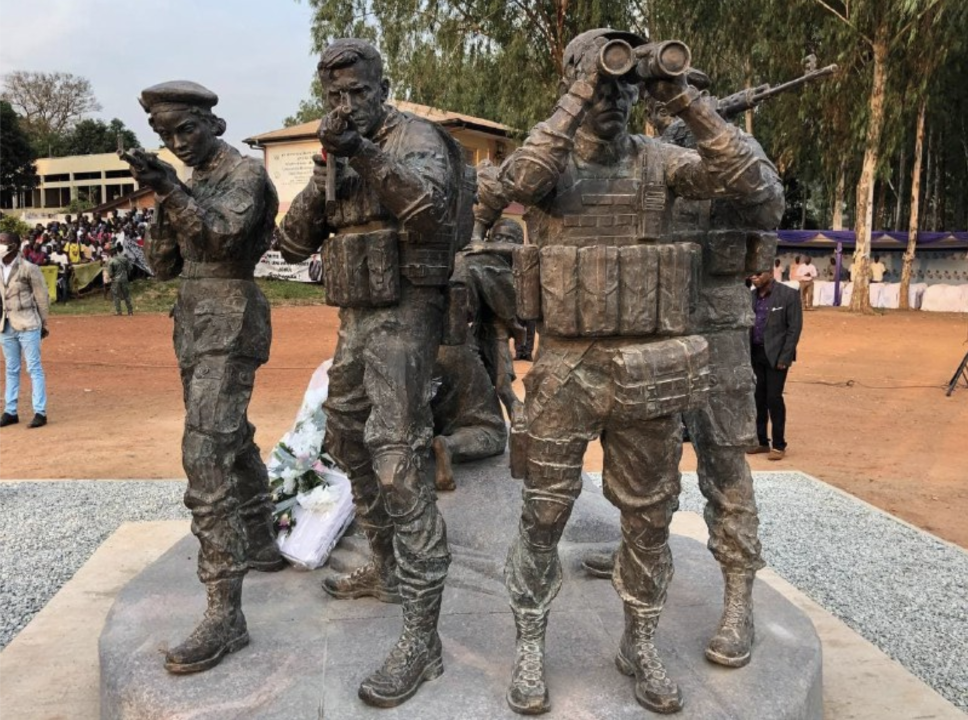 Wagner statue in Bangui, Central African Republic. (Source:
Wagner statue in Bangui, Central African Republic. (Source:
No comments:
Post a Comment